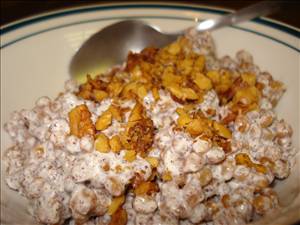Why We're Different: The PCOS Meal Planner Mission
Discover how PCOS Meal Planner's personalized approach transforms PCOS management through custom meal plans, guidance, and community support.
A spin-off of the traditional Ukrainian dish - Kutya - usually served during Christmas Eve supper. It is chewy, creamy and nutty and will keep you feeling full for many hours.
This recipe includes superfoods such as:
Poppy seeds are packed with calcium, magnesium, B vitamins, and zinc. Nuts are a natural source of Inositol, a derivative of Vitamin B (which is often prescribed in the form of supplements for women with PCOS). Inositol can effectively control the symptoms of PCOS by reducing insulin resistance and improving insulin sensitivity.
Walnuts are an excellent addition to the diet for managing PCOS symptoms. These nutrient-dense nuts are packed with healthy fats, protein, fiber, and essential vitamins and minerals. But what makes walnuts particularly beneficial for individuals with PCOS?
Walnuts are one of the best plant-based sources of omega-3 fatty acids, which are known for their anti-inflammatory properties. Reducing inflammation is crucial for managing PCOS symptoms, as chronic inflammation can exacerbate hormonal imbalances. Omega-3s also support heart health, which is important since women with PCOS are at a higher risk of cardiovascular issues.
Walnuts are rich in magnesium, a mineral that plays a key role in regulating insulin levels and improving insulin sensitivity. Magnesium also helps reduce inflammation and supports muscle and nerve function. Adequate magnesium intake can help manage blood sugar levels and reduce the risk of type 2 diabetes, which is commonly associated with PCOS.
The high fiber content in walnuts helps regulate digestion and maintain stable blood sugar levels. Fiber also promotes a feeling of fullness, which can aid in weight management, a crucial aspect of managing PCOS. Including walnuts in your diet can help prevent overeating and support digestive health.
Walnuts are loaded with antioxidants, which help protect the body from oxidative stress and damage caused by free radicals. This is particularly beneficial for individuals with PCOS, as oxidative stress can worsen symptoms and lead to further health complications. Antioxidants in walnuts support overall health and can help mitigate some of the negative effects of PCOS.
You might wonder, "How can I include walnuts in my meals?" Here are some ideas:
Another common question is, "Can I eat walnuts every day?" Yes, you can include walnuts in your daily diet, but moderation is key. While walnuts are high in calories due to their fat content, these are healthy fats that provide numerous health benefits. Aim for a small handful (about 1 ounce) per day as part of a balanced diet.
Walnuts are also a sustainable food choice. They are grown in various regions and have a lower environmental impact compared to many other nuts. Choosing walnuts supports sustainable farming practices and provides a nutritious, eco-friendly option for your diet.
In summary, walnuts are a highly nutritious food that offers numerous health benefits for managing PCOS. Their omega-3 fatty acids, magnesium, fiber, and antioxidants support heart health, reduce inflammation, improve insulin sensitivity, and promote overall well-being. With their versatility and delicious taste, walnuts are an excellent addition to any diet focused on PCOS management.
4 packets sweetener
1/4 cup chopped walnuts
1/2 cup light sour cream
2 tbsps poppy seeds
1 cup wheat berries
1. Pick through the wheat berries to remove sticks and debris, rinse in cold water and place in a slow cooker, cover with 6 cups of water and set on slow for 6-8 hours.
2. While the berries are on their last hour or so, cover the poppy seeds in about 1/2 cup of boiling water and let soak for 30 minutes. Drain poppy seeds and place in a blender with the sour cream. Pulse on high for 30 to 60 seconds, or until you can see that all the seeds are broken down in to small particles.
3. While the poppy seeds are soaking, chop walnuts and toast on a piece of foil in the oven at 350 °F (175 °C) for 10 minutes. Let nuts cool while you are prepping the rest of the dish.
4. Drain wheat berries, combine with poppy seed and sour cream mixture, add the Splenda, mix well until thoroughly combined. Sprinkle each serving with walnuts, serve warm.
5. Note: one serving is about 1 cup of wheat berry mixture with approximately 1 tablespoon of chopped toasted nuts (pictured in the photo). You can substitute 4 tablespoons of honey or sugar for Splenda, but add that in to your calories.
6. Note: wheat Berries can be found in the health food or bulk section of most supermarkets. If your store doesn't carry them check nearest Whole Foods or Trader Joe's.

Serving Size: 4
| Amount Per ONE Serving | ||
|---|---|---|
| Calories 283 kcal | ||
| Fat 10.96 g | ||
| Carbohydrate 41.7 g | ||
| Protein 8.45 g | ||
| Iron 63 mg | ||
| Calcium 53 mg | ||
| Cholesterol 11 mg | ||
| Monounsaturated Fat 2.01 g | ||
| Polyunsaturated Fat 5.38 g | ||
| Saturated Fat 2.85 g | ||
| Sodium 24 mg | ||
| Sugar 1.06 g | ||
| Potassium 337 mg | ||
| Vitamin C 4 mg | ||
| Fiber 6.8 g | ||
Managing PCOS can be challenging, but you don't have to do it alone. Join our supportive community to connect with others who understand what you're going through, share tips, and get encouragement. Here's how you can get involved:
Subscribe to our Newsletter: Receive PCOS-friendly recipes, tips, research updates, and more delivered straight to your inbox. Stay informed and empowered with the latest information and support.
Join our Telegram Channel: Stay updated with the latest tips and advice on managing PCOS.
Follow us on Facebook: Engage with our community, participate in discussions, and get support from others.
PCOS Coach AI: Access our 24/7 AI PCOS Coach and Meal Planner for personalized guidance and support anytime you need it.
Break the cycle with the PCOS Meal Planner - your personalized guide to eating better, feeling better, and managing PCOS symptoms. Take control today!

Forget the frustrating cycle of weight loss attempts, endless medications, and living in discomfort. Introducing the PCOS Meal Planner. A meal planning guide that goes beyond temporary fixes to offer a comprehensive strategy, empowering you to ignite a transformation towards lasting health and happiness. Step into a world where you control your PCOS, not the other way around.
Unlock Your PCOS Freedom Now.
Discover how PCOS Meal Planner's personalized approach transforms PCOS management through custom meal plans, guidance, and community support.
Learn how to select the best protein powder for PCOS management, understand key ingredients, and discover options that support hormone balance
Learn effective strategies to break through low GI diet plateaus with PCOS, including meal timing adjustments, food combinations, and lifestyle modifications.
Learn about common PCOS comorbidities, including insulin resistance, anxiety, cardiovascular issues, and effective management strategies for better health.
Learn how to select the best protein powder for PCOS management, understand key ingredients, and discover options that support hormone balance
Discover the best low-carb fruits for PCOS, with practical tips on timing, combinations, and portions. Learn which fruits help balance blood sugar and reduce in
Discover 7 powerful omega-3 rich foods for PCOS - including one surprising source most women miss. Plus, learn the perfect combinations and timing.
Discover 7 surprising ways spearmint tea helps PCOS symptoms - including one overlooked benefit that changes everything. Plus, get your personalized spearmint..
Discover how Sarah used AI coaching to transform her PCOS journey. Learn about real-time support, personalized guidance, and practical tools for managing PCOS